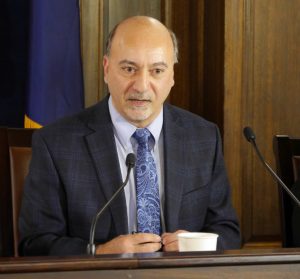The House Finance Committee turned its attention Monday to a tax that Gov. Bill Walker included in the compromise package he proposed a week ago. The tax has been called a few different names, including a “head tax” and an “income tax.”

Today, House Finance aides referred to it as a payroll tax. That’s because it would only tax the money people are paid for their employment, either on their employer’s payroll or through self-employment. But other forms of income – like the money people make on investments – wouldn’t be taxed.
Anchorage Democratic Rep. Les Gara said he’d rather have oil and gas companies pay more in taxes.
“The wealthiest pay the lowest percentage of their income under this bill, the way it’s written,” Gara said of Senate Bill 12. “The lowest income pay the highest percentage of their income under the way this bill is written, which seems a little backwards to me – or quite backwards.”
Under the current proposal, workers would pay one of five tax amounts – ranging from $50 for people making less than $20,000 per year to $500 for those paid more than $500,000.
Arnold Liebelt, an aide to Homer Rep. Paul Seaton, said the payroll tax could be changed to increase the number of tax levels, or to make the effect more similar across the income spectrum.
“There’s so many different ways that this can be sliced and diced,” Liebelt said.
North Pole Republican Rep. Tammie Wilson was skeptical of the tax. She noted that under the current proposal, some self-employed people would be able to deduct expenses before paying the tax, while employees wouldn’t.
“It’s another thing, just to bring up – that when we’re trying to be fair, ‘fair’ is something you go to in the summertime,” Wilson said. “You can’t always be fair when it comes to taxes.”
Both the House and Senate have passed bills to close most of the gap between what the state government spends and what it raises. They would draw from Permanent Fund earnings and reduce Permanent Fund dividends. But the House majority wants to set dividends at a higher level than the Senate. And while the House wants to raise taxes on income and on oil and gas companies, the Senate prefers spending cuts.
The special session will end on Friday. The Legislature has until the end of the month to pass a budget to avoid a state government shutdown.
Andrew Kitchenman is the state government and politics reporter for Alaska Public Media and KTOO in Juneau. Reach him at akitchenman@alaskapublic.org.




